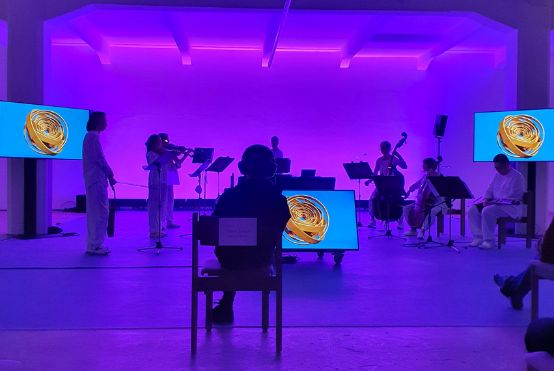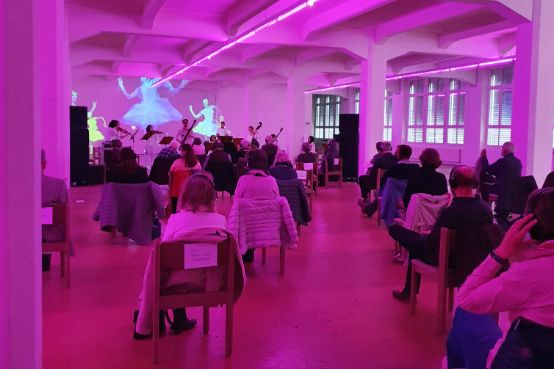Bachfest Schaffhausen: Experiments
Like many festivals, the International Bach Festival in Schaffhausen had to be postponed last year due to coronavirus. Now it took place "on a small scale" under the motto "Escape your worries" - with an original approach.

An example of the unconventional approach was the second concert, in which Friederike Heumann played works by Bach and his "sources" Dieterich Buxtehude and Johann Adam Reincken with her viola da gamba and the Stylus Phantasticus ensemble. And Alexander Melnikov presented various fortepianos by Anton Walter, Konrad Graf and Ignaz Pleyel for discussion under the motto "Grand Piano Worlds". The popular "Night of the Organs" was also a must, with graduates from Swiss and German music academies performing in Schaffhausen Minster and St. John's Church.
With Opium Burak Özdemir (*1983), one of the most creative minds in the field of early music, presented a cross-disciplinary project for the third time in Schaffhausen - a sound frenzy between baroque, new music and electroacoustics. The bassoonist and composer has been touring with his ensemble Musica Sequenza since 2008 and has made a name for himself internationally. He is at home in both the classical music scene and the electronic underground scene, and his vision is to break down the boundaries of space and time. His successful productions include The New Four Seasons, Silent Cantata and the sound installation series Transmute. His performances, for which he founded Musica Sequenza, have been shown worldwide at such renowned venues as the Elbphilharmonie Hamburg, the Lincoln Center New York, the Berlin Philharmonie, the Amsterdam Concertgebouw, the Vienna State Opera and the Teatro Colon in Buenos Aires.
Dreamwalking with "Opium"
With Sampling Baroque/Bach Özdemir designed his first creation for the Schaffhausen Bach Festival in 2016. Back then, he already toured with it, including to the Bachakademie Stuttgart. Now the new production Opium, which had its world premiere on May 15 at Kammgarn West in Schaffhausen.
Musica Sequenza played in a string quintet (with bass), plus lute, keyboard, a soprano and a sound designer as well as Özdemir himself on bassoon and as ensemble leader. The line-up changes constantly in Opium, new music follows baroque pieces and vice versa, including electronic alienation.
The production opened with a fantasia for solo lute by Silvius Leopold Weiss, followed by five arias by Bach, either for bassoon, strings and basso continuo alone or with vocals - and in between the Sarbande for solo cello. The musicians moved around the room and played other works from the Baroque period. And in between, four new pieces by Özdemir: Opium, The Sacred Wounds, Fata Morgana and Moroccan Dream. In the project's namesake Opium Özdemir explores the possibilities of synthesizing music for bassoon, strings and electronically generated sounds. This resulted in a fascinating extended listening experience that had something dreamlike about it. The Sacred Wounds from Özdemir's project Bach: Atlas Passion is originally a contemplative 4-channel audio installation for chamber choir, in which geographical references from the Torah, Bible and Koran are related to current global political issues. The version for string quartet, which was performed for the first time at the Bach Festival, also has something enchanting and magical about it.
The performance lasted 70 minutes and was divided into two parts. After the first part, you were invited into another room. There, you were given headphones through which you could either listen to the live sound or not. In this way, you were immersed in this modern acoustic-visual synthesis of the arts, in which baroque music resounded as if from afar. The lighting dramaturgy and movement also played an important role.
-

Photo: Bachfest Schaffhausen
The lostness of music as an installation
To complement this impressive performance, Burak Özdemir and curator and visual designer Daniel Mulder created an exhibition in the Chretzeturm in Stein am Rhein. Their motto "Opium locked down" referred to the artists' coronavirus isolation. It was a course of four installations spread across the floors of the building. On an audiovisual level, visitors could experience how the artists from Musica Sequenza occupied themselves at home during the lockdown: how they practiced, ate an apple, talked on the phone, fetched a glass of water in the kitchen ...
It was dreamy and delicate reflections that drifted through the Chretzeturm to intense sounds, as if the ensemble were there. But the rooms were empty, just as the stages had been for some time. This exhibition offered an impressive combination of sound art and visual design: calm, sometimes repetitive images cast a spell over you, while the music had something forlorn about it.
The next International Bach Festival Schaffhausen will take place from May 25 to 29, 2022.








